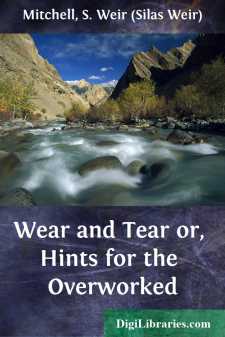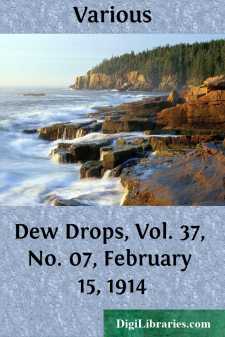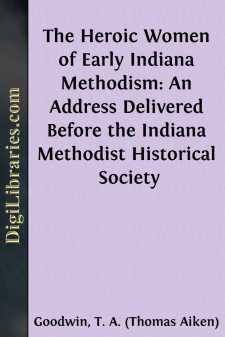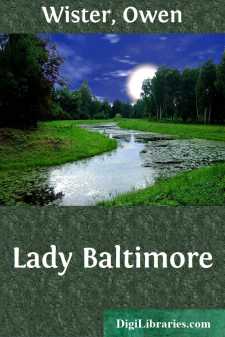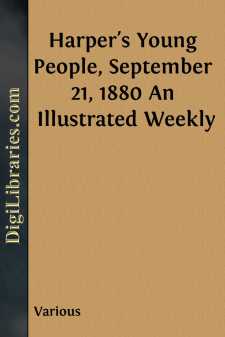Categories
- Antiques & Collectibles 13
- Architecture 36
- Art 48
- Bibles 22
- Biography & Autobiography 814
- Body, Mind & Spirit 145
- Business & Economics 28
- Children's Books 17
- Children's Fiction 14
- Computers 4
- Cooking 94
- Crafts & Hobbies 4
- Drama 346
- Education 56
- Family & Relationships 59
- Fiction 11833
- Foreign Language Study 3
- Games 19
- Gardening 17
- Health & Fitness 34
- History 1378
- House & Home 1
- Humor 147
- Juvenile Fiction 1873
- Juvenile Nonfiction 202
- Language Arts & Disciplines 89
- Law 16
- Literary Collections 686
- Literary Criticism 179
- Mathematics 13
- Medical 41
- Music 40
- Nature 179
- Non-Classifiable 1768
- Performing Arts 7
- Periodicals 1453
- Philosophy 66
- Photography 2
- Poetry 897
- Political Science 203
- Psychology 45
- Reference 154
- Religion 516
- Science 126
- Self-Help 85
- Social Science 82
- Sports & Recreation 34
- Study Aids 3
- Technology & Engineering 59
- Transportation 23
- Travel 463
- True Crime 29
Sort by:
WEAR AND TEAR, OR HINTS FOR THE OVERWORKED. Many years ago I found occasion to set before the readers of Lippincott's Magazine certain thoughts concerning work in America, and its results. Somewhat to my surprise, the article attracted more notice than usually falls to the share of such papers, and since then, from numerous sources, I have had the pleasure to learn that my words of warning have...
more...
"SEQUIL" OR THINGS WHITCH AINT FINISHED IN THE FIRST Sept. 7, 186- Gosh, what do you think, last nite father and mother and me and Keene and Cele and aunt Sarah was sitting at supper when father, he sed i am a going to read your diry tonite. Gosh i was scart for i hadent wrote ennything in it for a long time. so after supper i went over to mister Watsons and asked him if he dident want to see...
more...
by:
Jonathan Swift
INTRODUCTION Swift has been styled the Prince of Journalists. Like most titles whose aim is to express in modern words the character and achievements of a man of a past age, this phrase is not of the happiest. Applied to so extraordinary a man as Jonathan Swift, it is both misleading and inadequate. At best it embodies but a half-truth. It belongs to that class of phrases which, in emphasizing a...
more...
I It was the morning after the shipwreck. The five men still lay where they had slept. A long time had passed since anybody had spoken. A long time had passed since anybody had moved. Indeed, it, looked almost as if they would never speak or move again. So bruised and bloodless of skin were they, so bleak and sharp of feature, so stark and hollow of eye, so rigid and moveless of limb that they might...
more...
by:
Various
VOL. 37. NO. 7. WEEKLY.DAVID C. COOK PUBLISHING CO., ELGIN, ILLINOIS.GEORGE E. COOK, EDITOR.FEBRUARY 15, 1914. Arthur had a box of paints given him for Christmas, and he had learned to color pictures very prettily; so just as he was finishing the dress of a gorgeous Japanese lady such a happy thought came to him that he nearly spilled some yellow paint all over Miss Matsuki's gay pink dress, in...
more...
CHAPTER I. Uncle Billy rested his axe on the log he was chopping, and turned his grizzly old head to one side, listening intently. A confusion of sounds came from the little cabin across the road. It was a dilapidated negro cabin, with its roof awry and the weather-boarding off in great patches; still, it was a place of interest to Uncle Billy. His sister lived there with three orphan grandchildren....
more...
The Heroic Women of Early Indiana Methodism. "Arms and the man, I sing," said the great Virgil, thousands of years ago, and all the little Virgils have been singing the man ever since. But who ever sings the woman? Occasionally a Debora or a Joan of Arc, a kind of a female monstrosity, comes to the front and receives recognition, but their conspicuousness is due more to the low level of their...
more...
by:
Owen Wister
I: A Word about My Aunt Like Adam, our first conspicuous ancestor, I must begin, and lay the blame upon a woman; I am glad to recognize that I differ from the father of my sex in no important particular, being as manlike as most of his sons. Therefore it is the woman, my Aunt Carola, who must bear the whole reproach of the folly which I shall forthwith confess to you, since she it was who put it into...
more...
THE LAND How many boys or girls, I wonder, ever turn to their school atlas for amusement, or try to picture to themselves what manner of countries those might be whose strange and unfamiliar place-names so often make their geography lesson a difficulty? Yet there are few subjects, I think, which might be made more interesting than geography, and a map may often serve to suggest delightful fancies to a...
more...
by:
Various
Kitty was eight years old, and Ted was seven. They had always lived on a large farm, and knew all about birds and squirrels, and the different kinds of trees, and how to make bonfires and little stone ovens; and they could shoot with bows and arrows, and swim, and climb trees, and split kindlings, and take care of chickens and ducks and turkeys, and do a great many jolly and useful things which city...
more...


